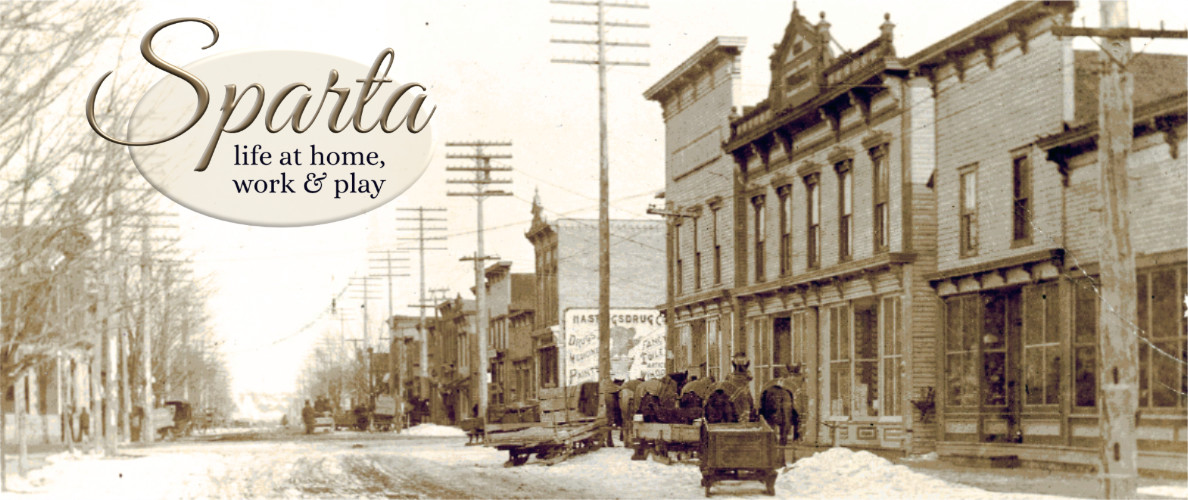


Competitive Spirit "Shorty Hodgins: Play Ball!", "Peanuts, Popcorn & Crackerjack Baseball", and "Nelson A. Shaw: Horse Sense"
Businesswomen Sparta's Millinery Mavens: "Catherine Roberts & Rose Adelia Gaut: Mother-Daughter Hatters", and "Dora May Clute: Self-Made Woman"
Milo & Ben The stories of two friends and early Sparta businessmen: "Milo Bolender's Pharmacy" and "Dr. Benjamin Zudzense & His Monkeys" with "Pinckney Paints the Town"
Main Street Merchants "Charles Henry Loomis", "Frank Cnossen: There's Friendship in the Cup", and "Hugh Finch: Where You Always Do a Little Better"
Hometown Heroes "George W. Powers Murdered Lawman" and "Mad Dogs & Marshal Meeker"
The Highway Arrived State Street corridor and post-war growth: "Camp Boys Come to Town" and "Sparta Builders" addressed the housing shortage
Merry & Bright How we celebrated: "Charlie Badgerow: Two Christmas Gifts", Christmases Past", "A Very Sparta Christmas", "My Christmas Memories", and "Sparta's Easter Bunny Helper"
People worked hard to earn a living and put food on their tables. Whether they resided in the village or countryside, a lot of manual labor was necessary to run a household. Life was not easy in Sparta's early days. At the end of the workday or workweek, time for relaxation and a little fun were welcomed. As the village grew, opportunities for entertainment were generally well received--but not quite always.
Almost immediately after establishing his Welch Folding Bed Company at Sparta, Lyman Welch swung for the fence when he fielded a local exhibition baseball team. And a good team it was! The Grand Rapids Press included an item in their July 25, 1889, Base Ball column: "The Welch folding bed nine of Sparta, were defeated by the Northern Kents at Cedar Springs yesterday by a score of 30 to 6, the Kents scoring 15 runs in one inning." OK. Not so good.
Not one to give up easily, Mr. Welch, who loved the game of baseball with a passion, had a plan. "He and a salesman would travel around selling their beds to furniture stores and would ask if they had any local baseball talent," Sparta historian Jim Lyals explained. "If they did, they would go back to see them play--and if real good, Mr. Welch would offer them a job in Sparta and come play for his teams!" He was true to his word. Even if a player wasn't able to perform a factory job, he would give them a broom to sweep up. "One of the best was Shorty Hodges (Hodgins) who later became the constable of Sparta."
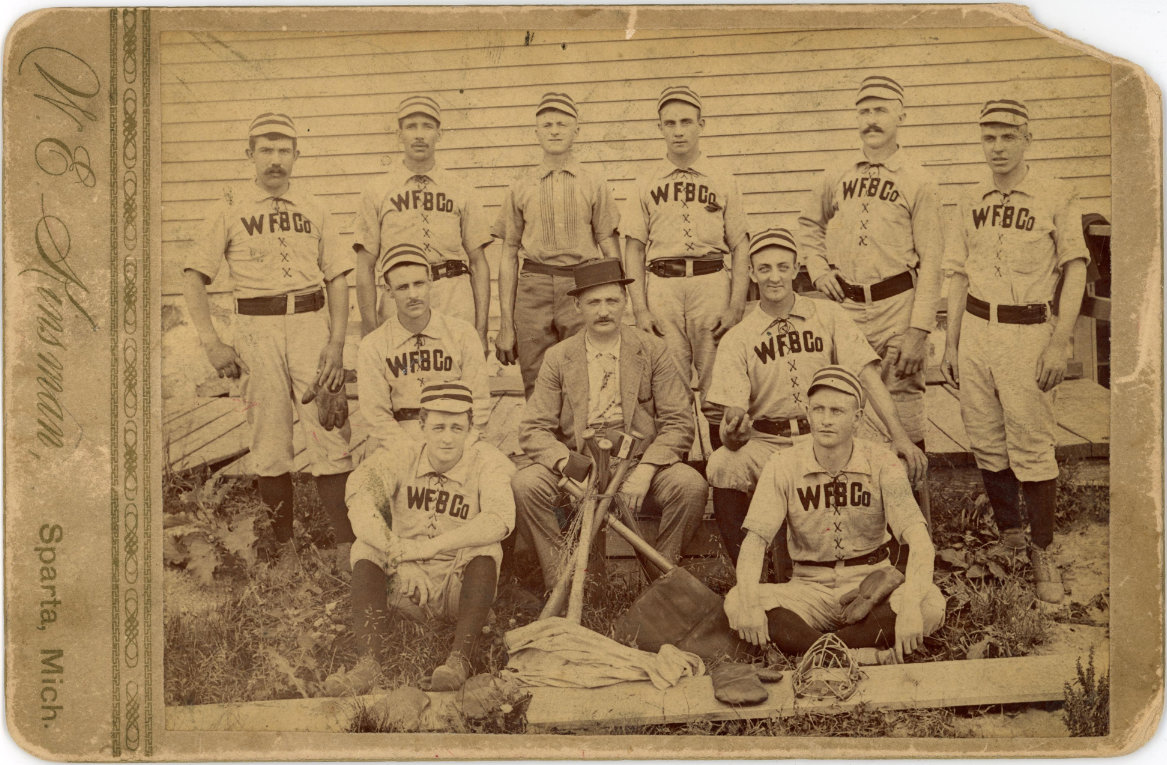
1890 Welch Folding Bed Co. baseball team--photograph by W.E. Kinsman courtesy of the Allen Collection and STHC Archives
By 1890, Welch fielded a better team. The highlight of the Fourth of July celebration was a ball game "between a picked nine from Muskegon and the Welch Folding Bed team, the latter winning by a score of 16 to 8. Over four hundred witnessed the game," as reported in the Grand Rapids Herald.
In BASE BALL AT SPARTA, the Grand Rapids Herald wrote on June 2, 1891: "SPARTA, Jun. 1.--Fully 200 patrons of base ball enjoyed the most exciting game of the season at Sparta Decoration day, between the Welch Folding Bed Co. club and the Belding Manufacturing Co. club, of Belding, Mich." Final score was 13 to 8 with the Sparta team the victors. The "batteries" credited to the Welch players were Hodgins and Hewitt.
J.C. "Shorty" Hodgins
Perhaps the best known Sparta resident baseball player from this era was Jay C. Hodgins, better known as "Shorty". The son of a carpenter, J.C. was born at Saginaw, Michigan on December 5, 1866, to James & Susan (Miller) Hodgins. By 1873, the family lived at Millington in Tuscola co., Michigan and in October 1879 his father passed away due to Consumption.
Shorty loved baseball--and he was good at it.
During the 1888 and 1889 seasons, Shorty pitched for the Midland Baseball team--where he was approached and recruited by either Mr. Lyman Welch or an associate who scouted baseball talent for the Sparta team. "He would give them a good job in his factory with good wages, if they would play for Sparta," Arzie Pinckney commented. "If they didn't know anything about working in a furniture factory they were given jobs that were easy to learn and yet kept them from doing work that might possibly injure them in any way."
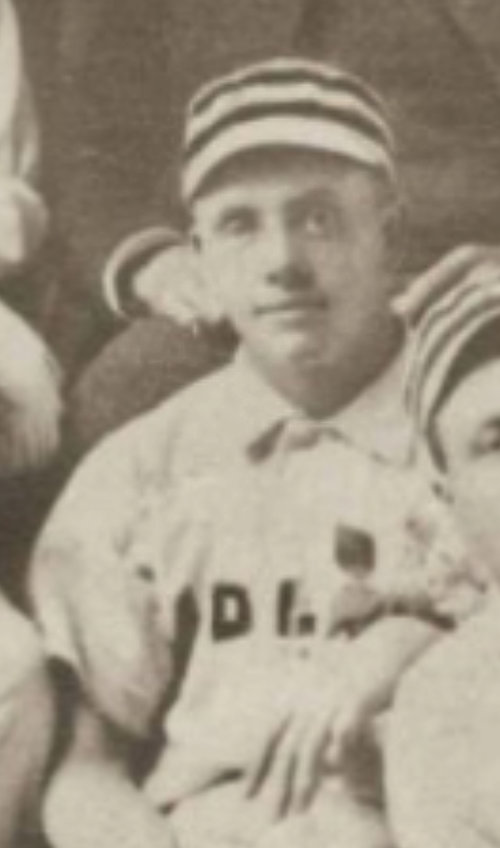
Shorty Hodgins 1889 Midland baseball team--courtesy of the Midland County Historical Society
Shorty was among several men that played on the Welch Folding Bed Co. team who married and settled at Sparta. On June 20, 1891, he wed Rosella "Zella" Harrison, the daughter of Joseph R. & Alice (McNitt) Harrison who operated a general store at Sparta. Successful milliner, Dora May Clute was her aunt. The following year, his "success as a pitcher soon led him to follow the game in various Michigan towns; Saginaw, where the Hodgins lived a year; Carson City, where they resided five years; Portland where they spent the next seven years, and several towns in the state of West Virginia where they lived briefly. Four years were spent near Bangor, Maine, on a farm," detailed a 1941 article in The Sentinel-Leader when the couple celebrated their 50th wedding anniversary.
Their first child, Gladys, was born in April 1892 at Sparta. A son, Robert Earl, arrived at Point Pleasant in Mason co., West Virginia in 1893. The Hodgins resided at Portland in Ionia co., Michigan when heartache stuck as little Gladys passed away--the victim of Malaria Fever in April of 1902. Five months later a daughter, Merle Ruth, joined the family followed by sons Alton Loomis in 1905 and Frank Miller in 1907--both at Peacock in Lake co, Michigan. At about 1909, J.C. & Zella rented a twelve room farm home on the west side of Loon Lake and the couple developed the property into a popular tourist resort. Youngest son, Frank, at ten years old, accidentally broke through the ice while skating on Bass Lake on November 24, 1918, nearby their home. He fell in and although his brothers desperately tried to save him, they could not and the young boy drowned.
In July 1918, the Hodgins made plans to return to Sparta "later in the season". December of 1918 brought the Hodgins family back to Sparta from Peacock where they could be close to family and friends. J.C. was briefly employed as a traveling salesman until he took the position of Express Agent to manage shipments of parcels, money, and goods by railway. Public service called in 1919 when he took on the responsibility of Village Marshall. Duties included directing traffic at the intersection of Division and Mill (now Union). An admired figure, when the Sparta Village Council erected a WWI memorial at that crossroads, it was affectionately known as "Shorty's Monument". Later, in 1923, Hodgins became a Kent County Deputy Sheriff but soon returned his focus to Sparta when, in 1926, he was elected Constable, a position J.C. held into the 1940s.
The Sentinel Leader published a front page article on September 11, 1925, HODGINS LIKES MICHIGAN which noted highlights of J.C. & Zella's two month trip. They traveled by automobile to the west to visit family in Boise, Seattle, Los Angeles, and Oakland. "Mr. Hodgins habits of prayer, acquired in Michigan came into good play when the party traveling the cut out mountain roads, with no more than 8 or 10 inches between them and a flight over the cliff for a mile or two. Hodgins says he left the prints of his finger nails in the framework of the car. He also went fishing for salmon in the Salmon river of Idaho and photographs indicate he made a good catch. "It's mighty fine out there" says Shorty, "but there's nothing but Michigan for me."
Among some of the other early ball players with local ties were: Bert Camp, George Ryan, Bill Carr, Homer "Slab" Warner, Emory Anderson, Chuck Hilton, and Clarence Pinckney.
Bert Camp
Herbert was born at Allegan, Michigan, on May 17, 1869, to Andrew Jackson & Ann M. (Smith) Camp. He came to Sparta to play ball in 1890. "Bert was a fine shortstop, also an excellent wood finisher which assured him of a good job in the factory," Mr. Pinckney recalled in his "I Remember" column. "In those days, furniture-finishing was a real profession. It took several coats of varnish to give a real good finish that had some depth to it." His father, Jack, was also employed in the finishing department.
Bert married Anna Pearl, a daughter or John A. & Phebe Brown of Sparta. Phebe's maiden name was also Brown but from an unrelated family. John Brown was a cooper and drayman.
George Ryan
An Irishman, Thomas & Margaret (Gorman) Ryan, welcommed their son, George Patrick in December 1885. The boy grew up in Sparta and his father, who was an engineer, held the position of Water Works Superintendent for many years beginning in 1889. When the Federal Census was enumerated in 1910, George, his father, and two brothers were employed as machinists.
"George Ryan, better known in Sparta one time as "Hogan", but later he went by the name of "Buddy", as he liked to be called, was a Sparta boy," Arzie Pinckney wrote in the local newspaper. "I remember George as a baseball player, and one of the best third basemen that ever played baseball in Sparta. That was in the days when most small towns had good teams."
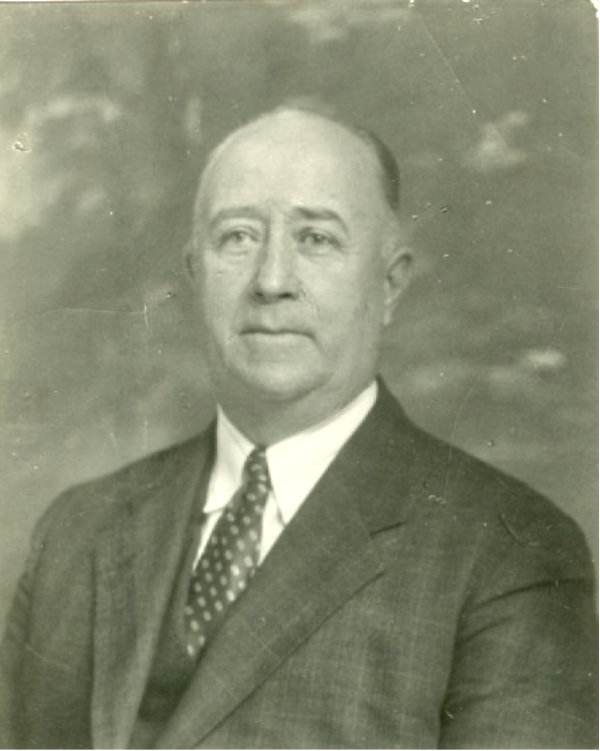
William Carr portrait--STHC archives
Bill Carr
A Christmas day wedding at Sparta in 1895 was the occasion of William Henry Carr and Tina Amelia Everett's marriage. The groom was born in July 1875 to William S. & Dora A. (Boorom) Carr. His mother passed away in 1893 and Bill briefly resided with his grandparents, Anthony & Sally (Finch) Boorom, before striking out on his own.
"William "Bill" Carr was another Sparta product. Bill was a very fine pitcher. He had some methods of pitching that puzzled the very best batters."
"He became foreman in the machine room of the Welch Company, a position he held for several years and then was promoted to the superintendent of the plant, a position he handled with great success until the plant closed in 1931." Tina's parents were early settlers, Benjamin Franklin & Carrie (Rice) Everett. The Carr family "lived in the Everett home on the (SW) corner of Nash and State Streets for many years, but they finally razed it and built the home now (1965) owned by Dr. Frank Bull."
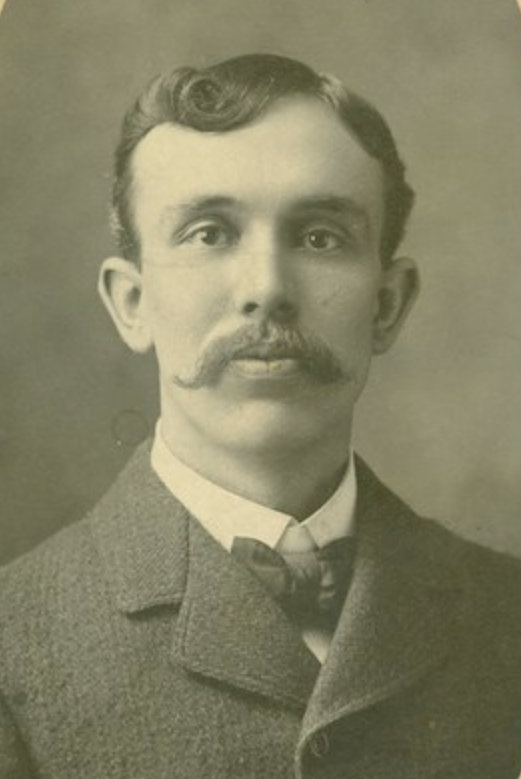
Emory Anderson portrait--courtesy of the Jill Baehre Rothwell collection
Emory Anderson
"Emory Anderson was another Sparta boy who became a fine centerfielder and played that position for several years. He was also a good hitter," Arzie remembered.
On February 9, 1872, friends and family celebrated the birth of a son, Emory Gus, to William A. & Emma (Brace) Anderson. At the time when the 1900 federal census was recorded, he was employed as an express agent and resided at his parents' Sparta home along with a young lady boarder who worked as a milliner, Chloie I. Grant. In January 1902, Emory and Chloie became man and wife. Self-employed by 1910 he operated a coal and ice business. A decade later, he was a chemist at the condensery.
Mr. Anderson founded his own insurance agency by 1930, and continued to operate it until a fateful night in 1951 when the furnace malfunctioned at their home on West Division, asphyxiating the couple in their sleep.
Chuck Hilton
"I remember Chuck Hilton. He was one of the most spectacular players on the team. He played first base and I remember how during practice the other players would try to throw the ball either over his head and just out of his reach or try to put the ball so that it would pull him off the bag. But it seemed to us younger kids that he could jump 50 feet in the air or stretch out full length on either side and always come up with the ball with his foot still on the base." Arzie recalled Hilton's job when he wasn't playing ball: "Chuck was a spring weaver in the Welch factory. No coil springs were used on the beds as some models had to be folded up."
A son of Sparta pioneers Charles Byron & Caroline A. (Myers) Hilton, Chuck slid over home plate on March 11, 1872. His maternal grandparents were Hiram & Barbara (Traxler) Myers, benefactors who provided a schoolhouse and cemetery for the community.
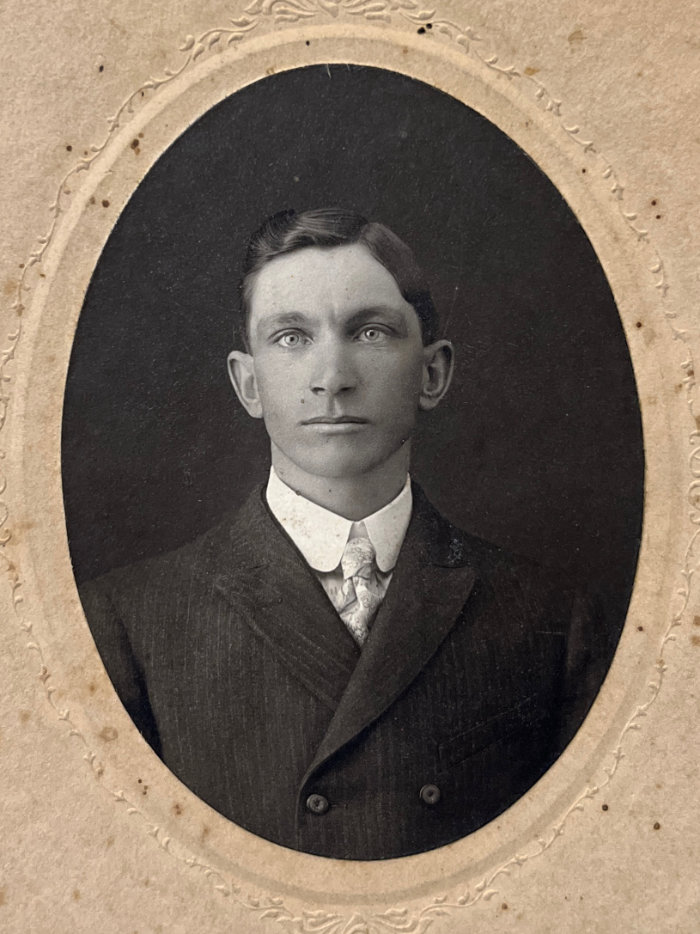
Clarence Pinckney portrait--courtesy of the Harley-Mink Family collection
Clarence Pinckney
Franklin P. & Ida A. (Black) Pinckney greeted their first child, Clarence Harry, on July 6, 1879 at Trent in Muskegon co, Michigan. He is often mentioned in his younger brother Arzie's newspaper articles with admiration as he had various jobs at several stores around Sparta as a young man. The 1900 and 1910 Federal Census records indicate his employment was as a laborer at a local factory while in 1920 he worked at the Sparta Tile factory. He first was wed to Viola Emma Blackall in 1897 then married Erma M. Myers in January 1908. She was the daughter of early Sparta settlers Andrew Perrin & Carrie Adelle (Balcom) Myers.
"Our brother, Clarence, was another Sparta product," wrote Arzie. "He was a second baseman. While he was not such a long ball hitter, he was a hard man to pitch to and would often get a base on balls. From then on he was rough on the catcher for he was one of the fastest players that Sparta ever had and he held an enviable record as a base stealer."
"I remember a colored team that came to Sparta regularly for several years. No Sparta player could get on base unless they wanted him to, but they usually let Clarence walk just to try to catch him stealing second base but they seldom caught him."
Where was the Ballpark?
"At that time, Gardner Street only extended from Martindale to Maple Street. Washington and Union Streets ended at Centennial Street. There was no Pearl or Vine Streets, nor was there an Averill Street. All of that land was a big cow pasture," Arzie Pinckney described the ball park's location in his June 9, 1965 column for The Sentinel Leader. "Many people in town had cows and they were pastured there. The baseball park was in the northwest corner of the field. There was a big grandstand with bleachers on both sides of it. There was a six foot solid wood fence that extended far past third base and well past first base nearly out to right field, while the one of the east did not go quite so far. The main entrance was on the north side and was reached by a path between what is now (1965) LaVerne Schut's home on Centennial Street and the house east of it which, was at that time Elder Maynard's home."

Sparta's first baseball park--and three cows grazing! Maple Street in the foreground, homes facing Centennial on the right, and State Street in the distance. Image to appear in The Sparta Where We Lived coming soon!--Fred C. Corry photograph (1902-1903) courtesy of the Allen Collection and STHC Archives
"In the spring before the season started, the cows were allowed to graze all over the place. They must have been permitted to do so in order to keep the grass down for as far as I can learn no one paid for pasturing their cows there. When the season began, the cows were confined behind a barbed wire fence across the south end of the field, but it was necessary to do a real job of getting rid of the Dutchmen's Razors in the infield and among the grandstands and bleachers." One could surmise the outfielders had more to contend with than just catching balls--and a bit of extra entertainment for the folks in the stands!
"At that time the catcher was the only one on the team that wore a glove. All the rest of the players did so with bare hands. The catcher also wore a mask but no chest protector or shin guards. He always stood several feet from home plate until there was two strikes on the batter and then put on the mask and came up close in order to catch the third strike. Later on the first baseman wore a glove because most of the infields would put some speed on the ball when they threw it to first."
Note: Double Header! Part two will highlight the Sparta team's exploits after 1900.
The turn of the century started out bright for Sparta baseball. Of course, there were some ups and downs. A game played on the home diamond against the Grand Rapids Giants opened the 1902 season on the 17th of May. Unfortunately, hopes were dashed as the final "score was 18 to 5 in favor of the visitors," reported the Detroit Free Press. Some of the teams which the Sparta nine faced that year included the Internationals, the Rubber Plant nine, Black Knights, and Furniture City Juniors.
In April 1903, it was announced in the Grand Rapids Press that the Sparta Nine Will Tour the State as "The Sparta Base Ball association will put a fast semi-professional team in the field this summer. Several players in the southern part of the state have been secured and will be here in a few days. The team will be under the management of John Howard Seabrook, a local business man. He states that two tours of the state will be made in July and August with the intention of playing the leading teams in Michigan. There is plenty of money behind the team."
John Howard Seabrook
Born July 24, 1879 at Muir in Ionia county, Michigan to Joseph Absalom & Lorinda (Fedewa) Seabrook a son was welcomed into the family. John, who sometimes went by Howard, spent his boyhood on his father's farm. As a young man, he struck out into the world to make his own way. Soon, he met the love of his life and on December 1, 1902, wed Miss Hazel Cotton, a telephone operator, at Sparta where he was a pharmacist. Seabrook was named the manager of Sparta's semi-professional baseball team on April 15, 1903. The couple had a daughter, Martheen, in 1905 before he briefly took a position as a traveling salesman at Plainfield, in Will county Illinois, then returned to Grand Rapids.
New Ball Park--New Name
As the village's population grew, a need for more housing became apparent. In 1910, the village extended a street south from the corner of Centennial and South Mill--which soon became South Union. Additional streets filled in so that new homes soon transformed the former cow pasture and baseball field into neighborhoods. Willow Park was created on the north side of Sparta Creek (Nash Creek) convenient to downtown with a permanent baseball diamond and bleacher seating, now know as Ballyeat Field. It would serve the purpose not only for the renamed Sparta Merchants baseball team, but also host high school and other local sports or events.
Glory Days
In the early days of semi-pro baseball a predetermined season schedule wasn't part of the way things were done. Instead, it was left more-or-less to chance. A good team would have challengers lining up around the block for a match with solicitations published on the sports pages of the city paper. One of the most anticipated games was against Sparta's neighbor, Rockford.
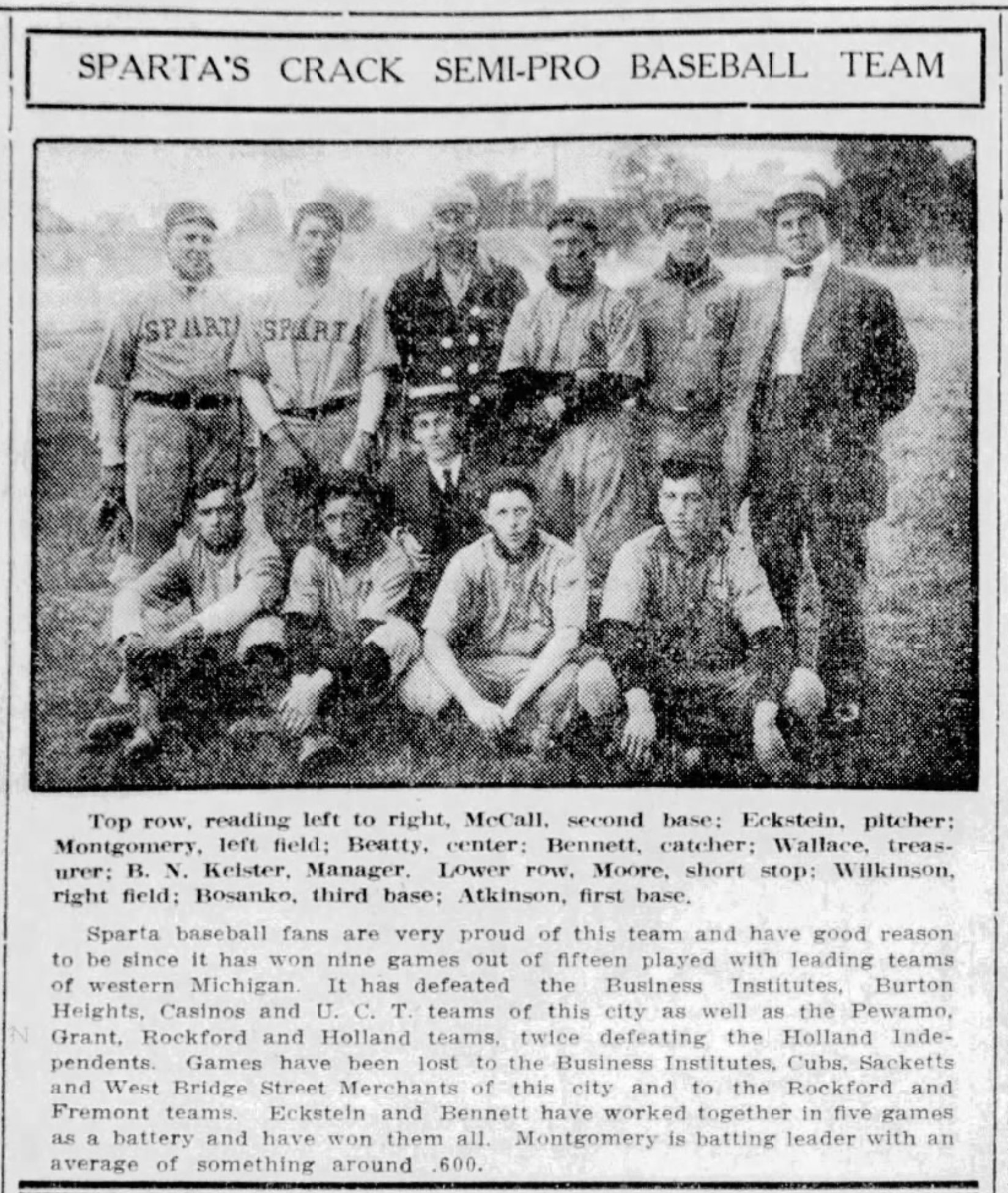
Sparta's 1911 baseball team--The Grand Rapids Press (16 Aug 1911)
By mid-August 1911, Sparta's record was nine wins out of fifteen games played against West Michigan teams. Other clubs wanted a chance to slug it out on the ball diamond with the hometown boys. "Sparta and Rockford had games scheduled. Rockford won the first two and Sparta won the next two on their own ground, and they claimed the championship. Rockford claimed that the umpire was partial to Sparta and that Sparta's field was unfit to play on. Soon things began to buzz in both towns and bets were made that things would be different if they played another game," Arzie Pinckney wrote in his "I Remember" column from the The Sentinel Leader (21 Jul 1965).
In September, a wager of between $50 and $500 was proposed by Rockford with an accompanying challenge to play that was published in the sporting column of The Grand Rapids Press. Rockford included a qualification that "no player take part in the game except those who have taken part in the four previous games of the series of five, of which each team has won two." In other words, no ringers were to be brought in for this competition. A lot was at stake.
The challenge was said to have "greatly aroused the baseball fans of Sparta." A meeting was arranged with "almost every fan in the town attending, all offering to help towards raising an amount sufficient to cover the full offer." Undoubtedly, $500 is a sizable sum but considering the value of that amount in 1911 to its worth in 2025 it's the equivalent of $17,051.37. A lot of money to raise and put at risk. Additionally, the game was to be played at Ramona Athletic park in Grand Rapids, a neutral location that was sure to draw a large crowd. Other stipulations advanced by Sparta called for two disinterested league umpires, "the winners to take the entire gate receipts and the side purse of $1,000" with each team to cover their own expenses no matter the outcome. "A committee of Sparta's leading citizens accompanied Managers Keister, Murray, and Reichert to deposit the check and present Sparta's side of the argument for publication." The certified checks were kept in the newspaper's safe until after the game.
A headline proclaimed SPARTA ACCEPTS IT as "A certified check for $500, drawn on the Sparta State bank, was deposited at noon today (9/22/1911) with the sporting editor of The Press as a wager on a decisive game of a series of five between the Rockford and Sparta baseball teams."
Negotiations settled on dividing the gate receipts with "Sixty percent to winner and 40 per cent to the loser after deducting expenses amounting to about $75". It was agreed the stake would be declared as the Northern Kent county championship.
"As the time for the game neared, the tension in the towns rose to a high pitch and many bets were made between the towns people. It was estimated that more than $2,000.00 changed hands as a result of the game." Mr Pinckney recalled, "Two days before the game, the teams could not agree on the umpire. But at last Cuppy Groeschow, a league official, was finally chosen."
William F "Cuppy" Groeschow
William was born in February 1878 at Adrian in Lenawee county, Michigan to German immigrants, Charles & Henrietta (Mueller) Grüschow. The son grew to love basebal--and was good at it. Cuppy played short stop for Ohio's Dayton Veterans, South Bend, Indiana's first pro baseball team, the Green Stockings, in 1903 and went on to the Grand Rapids Wolverines in 1906 where he was named a manager in 1907. Cuppy managed the Terre Haute Hottentots in 1908 and 1909 then on to the Terre Haute Stags in 1910. The team manager could still play ball--and he did.
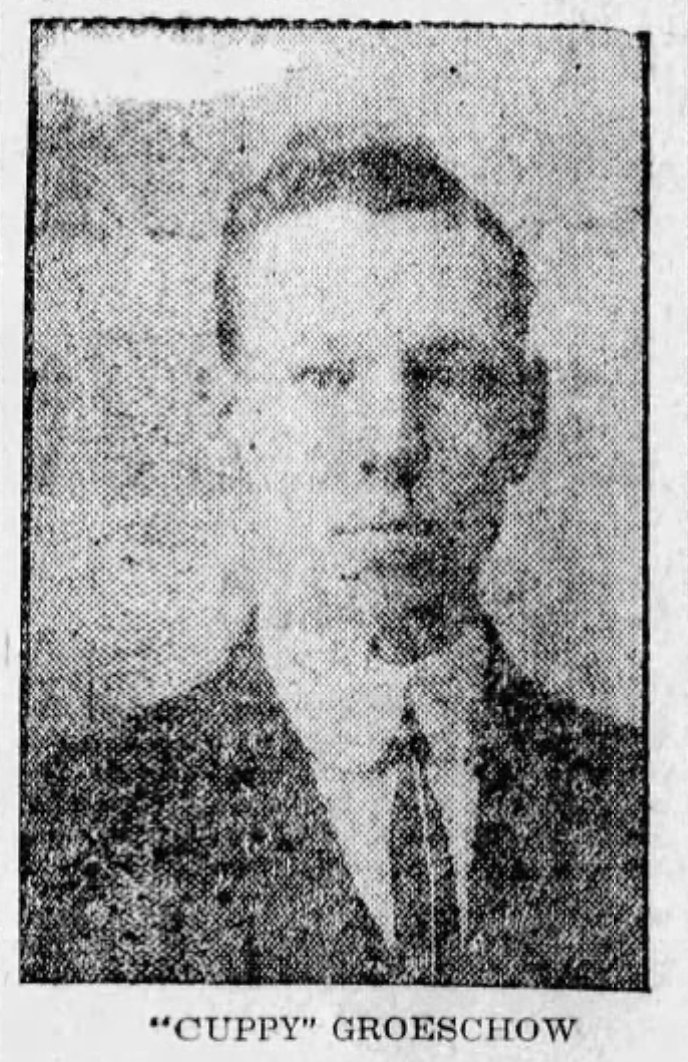
Shortstop, Manager & Umpire William "Cuppy" Groeschow--Evansville Courier and Press (23 Apr 1913)
At home in Adrian on the off-season, he filled in for a friend at a mill so he could attend a dance. "Though he was a skilled workman, he had not worked at fence making for some time, which was probably the cause of the accident," his brother told an Indiana newspaper. "When he pressed the control lever with his foot he lost his balance, falling into the machine." William's left arm was caught in a loom at the wire factory and smashed at the elbow.
On January 4, 1911, The Grand Rapids Press published the headline: CONDITION CRITICAL--Cuppy Groeschow's Injured Arm Amputated Near the Shoulder. Two days earlier when the accident occurred "his arm was so badly torn it had to be amputated two inches below the shoulder. A wonderful constitution is depended upon to save him. His sufferings are terrible, the ligaments of his arm being literally pulled from his body. The injured baseball player will never be able to play baseball again, but has sufficient means to live comfortable by careful investment. At the time of the accident he was talking to friends of the trade whereby he was to play with the Utica team of the New York State league next season."
"Out of the game for good" dozens of articles proclaimed. Within a week, talk surfaced in news items of Mr Groeschow becoming an umpire, if he was interested in doing so. Down, but not out, Cuppy recovered and with great determination, he stuck with the game he loved. Just three months later, he umped his first game at Dayton, Ohio--the very same diamond where he began his career as a shortstop. As a Central League umpire, he didn't allow rowdy play or foul language and soon earned a reputation for his fairness and excellent judgement.
Big Game--Big Gamble
"One hit, the only one made by Sparta off the delivery of Pitcher Lefty McDonald of this city, scored two runs and won the northern Kent county championship for Sparta over Rockford," The Press write-up on October 2nd stated. Final score was "2 to 0 before a crowd of 2,000 fans, a greater part of them coming from the two towns represented." In spite of McDonald having seventeen strikeouts, he was robbed of the glory. Sparta's Pitcher Ekstine was "as steady as clockwork throughout" especially when bases were loaded and he dashed Rockford's hopes. "Third Baseman Bosanko, Shortstop Moore and First Baseman Atkinson of the Sparta team were fielding heroes of the day. No less than three times Bosanko made stops which would have been a credit to major leaguers, each of them when men were on the bases and the tide of battle apparently about to turn. Shortstop Moore made a running catch of a line drive which bordered on the sensational and First Baseman Atkinson made two pickups of bad throws which were exceptional for an amateur."
"Sparta only had one hit off McDonald, that was in the second inning. A walk and two errors by the over-anxious infielders put men on second and third bases. With one out, Sparta's catcher, Bennett, smashed a hard single down the first base line which scored two runs," Arzie recollected. "Despite the edgy rivalry, no arguments arose during the game, although the feeling for revenge at Rockford was tense."
"The attendance at the game was 1,963 with the gate receipts at $685.50. This was split 60-40 after the expenses were paid which were about $75.00." Arzie added, "Incidentally, Sparta's take from the big game was about $1,365.00." To put it into perspective, in today's dollars that amounts to a hefty $46,550.24. No small potatoes.
"After the game Manager Hunting of the Rockford team made the following sportsmanlike declarations: "We take off our hats to the victors. They beat us fair and square and there are no sore sport on our part. Our boys did their best and the break of luck was against us, but the Sparta boys played a grand game and deserved to win on the strength of it."
"In the evening, after the game, the Rockford players were entertained at the Pantlind hotel by a fine spread as guests of Manager Keister of the Sparta team. Special trains were run from both towns and fully 1,200 came from the two places and vicinity."
For the rest of the story, Mr Pinckney continued, "Two weeks later, the high school football season started and Rockford hoped to avenge the baseball humiliation by whipping the Sparta team. When the Spartans came off the field with a 60 to 0 victory over the Rams, the rivalry between the two teams began and has existed ever since. The worse defeat in the history of the Spartan-Rams series up until 1953 was in 1917 when the Rams beat the Spartans by a score of 100 to 0."
Dream Team
As the 1912 season approached, hopes were high in March as The Grand Rapids Press printed an article, SPARTA IN FIELD--Another Fast Semi-Pro Baseball Team This Season--EXTINE AND BENNETT--To Form Battery and May Be Joined by Slabs Warner. The praise continued: "Sparta is to be in the field again this year with a crackerjack independent baseball team. Its lineup will be greatly the same as in the decisive game for northern Kent county championship honors last fall at Ramona Athletic park, which was played for a side bet of $500 with the Rockford club, the side bets being posted with the sporting editor of The Press and being genuine, not stage money."
"B.N. Keister, banker and enthusiastic baseball fan, will again manage the Sparta team. The officers of the Sparta Baseball association are as follows: Manley W. Burtch, president; J.W. Fiefield, secretary; Henry Murry, George Richards and B.N. Keister, directors. President Burtch is the leading manufacturer of Sparta and Secretary Fiefield is editor of the Sentinel Leader of Sparta, a loyal supporter of the team."
"Pitcher Bert Extine of Elk Rapids and Catcher Frank Bennett of East Jordan, who formed the Sparta team's star battery last season, will wear Sparta uniforms again. Other players of last year's team who have promised to return are: Walter Atkinson, first base; Joe Montgomery, second base; Doc Bosanko, third base; Dea Moore, shortstop; Beatty and Wilkinson, outfielders."
"New Outfielder Signed. A new man of whom great things are expected is Outfielder Ellis of Elk Rapids, recommended by Pitcher Extine, who has become a resident of Sparta. Joe Montgomery, another of the outfielders, is a resident of Grand Rapids. The winning of the big game here last fall, at which there was an attendance of over 2,000 even after baseball interest locally seemed dead for the year, has made baseball enthusiasm greater in Sparta than ever before, although it has always been a great baseball town."
"In the early nineties the Welch Folding Bed company team of Sparta was a leader among state independent teams, developing a half dozen or more players who afterwards achieved league fame, John Ganzel being among them. A team has been supported in the town each year, but the one of last season was the strongest since the team of twenty years ago. Slabs Warner, former Central league star, a winning pitcher in the southern Michigan league for several years, has about decided to retire from league play and play with his home town team, captaining and coaching it this season. If he does his own and Extine's pitching should make the Sparta team almost invincible."
Walter Atkinson
"Walter Atkinson was another Sparta boy who played baseball," Arzie Pinckney reflected in his local Sentinel Leader column. "Walt was a fine third baseman, although he could do an equally fine job at first base. Baseball was a business with Walt and no monkey work for him."
Born at Portland in Jay county, Indiana but raised at Sparta, Walter's birth was on October 16, 1885, to Daniel Webster & Emma Elizabeth (Fetter) Atkinson. Dan was a produce dealer in 1900 who went into real estate by 1910 while Walter was employed as a machinist at the Baldwin Machine Co in Sparta. The family lived on North Union Street. Later, Daniel invested as an original stock holder of the Handy Wacks Corp and became sole owner in 1932. Walter's older sister, Mrs. Lou Keller, managed the office and was prominent with the Handy Wacks Co. Walter remained a bachelor and resided at 204 Harper Drive until he passed away in 1963.
Homer "Slab" Warner
What a name for a ball player!
Son of Dwight M & Flora Sophia (Hammond) Warner, the future baseball star, Homer William, was born at Sparta in October 1882. "Mr Warner owned and operated the Sparta Brick Works for years which is a real story in itself," Arzie remarked. "Slab started in as a schoolboy and became a wonderful pitcher for Sparta. He married Miss Alice Ryan," in 1909 who was a sister of fellow ball player, George.
Homer's time at Sparta's diamond came to an end when, in 1905, the Grand Rapids Orphans made him an offer he couldn't refuse. The next year he played for the Grand Rapids Wolverines. "Some wag of Sparta remarked that Warner's safe hit is a Homer," a July 1906 write-up in The Grand Rapids Press stated. "They are very proud of the fact up in Sparta that Homer Warner is the leading pitcher of the Central league and also a resident of Sparta." Soon, the newspapers christened him "Homer Sparticus Warner" as he impressed on the mound with his pitching and sports page banners championed his "WALLOP SPIT BALL".
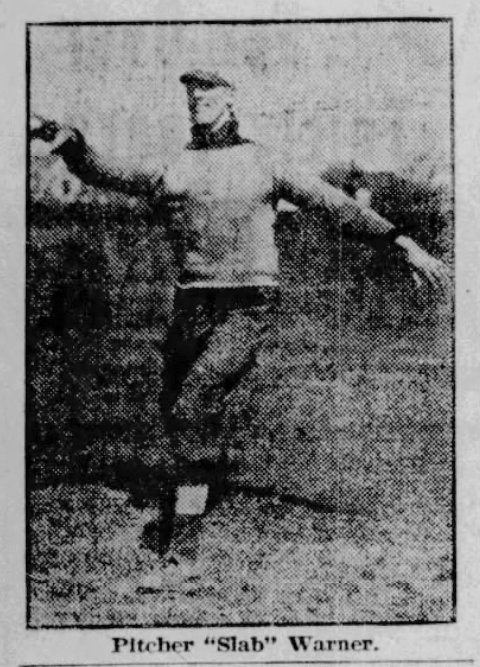
Pitcher Homer "Slab" Warner--The Grand Rapids Press (10 Mar 1908)
"When Slab Warner, Sparta's most prominent citizen, first joined the Grand Rapids team he was about as graceful in the execution of handling a ground hit ball as an auto running on a flattened tire. But he could pitch," The Press began in their "Current Sport Gossip" column from November 11, 1908.
"A local newspaper man never fails to elicit delight when he tells the story of Slab's debut into "pro" company. It was at Sault Ste. Marie that Slab was imported, a fresh cheeked, country boy as narrow as a railroad spike and as tall in proportion. In his first game he forced something like twenty-one men to paint the ozone with their bats and after the game apologized for what he termed a bad day. But Slab was at that time worse than a vaudeville comedian with the stick and at fielding. The management got tired of seeing him excavate about two tons of dirt every time a grounder was rolled at him and asked him one day why he didn't learn to field. "Who, me?" exclaimed the surprised youth, "why, all I had to do back home was to fan twenty-three or twenty-four men and the rest of the bunch did the rest. I ain't no infielder." And the owner let it go at that."
Briefly, in 1909, Homer twirled for Sparta before he accepted an offer to play in Lansing with the Senators. The following year, he added the moniker of 'Coach Warner' at the M.A.C.--that's the Michigan Agricultural College, before it became Michigan State--as he continued to pitch and even took up writing. In spite of the onset of rheumatism in his leg, his mound performance didn't suffer. Papers heralded his prowess with "WARNER PITCHED SENSATIONAL BASEBALL" and "SLAB WHIPPED 8 MEN". In 1910, Homer "set a Southern Michigan league record while pitching for Lansing. He hurled 10 shut out games in the course of the season, winning 23 games against 10 defeats," The Lansing State Journal reflected upon his achievement in a 1953 column.
"Another Ball Player" joined the Warner family in December 1910, the Lansing State Journal announced. "Lansing's great baseball pitcher was married in Sparta last winter, and Mrs Warner is well known in Lansing, having resided in the city a considerable portion of the past baseball season." The seven pound boy was born at Sparta and named Thomas Ryan Warner.
For several years, "Slab" pitched at Lansing. Excitement over the prospect of the hometown boy returning to their mound and coaching was short-lived. Instead, he took an opportunity to manage and pitch for the Cadillac Chiefs team in 1913. No matter where he played, as soon as the season was finished, he always returned home to Sparta.
Note: One of the things fans love about the game of baseball is when it goes into Extra Innings--as will this story. Part three picks up where we left off with the 1912 action.
Lured by .75 cents an acre land offered by the State of Michigan, in 1852 John Freeman Shaw, his wife Eliza Jane (Van Gordon) and their four-year old son, Nathaniel, left Niagara county, New York for a new life on the frontier. "In coming to Michigan the Shaw family voyaged by Lake Erie and the Detroit River to Detroit, and thence proceeded overland to Marshall..." to the home of John's sister. Their journey was highlighted in James L. Smith's An Account of Muskegon County (1924) in Nathaniel's profile. "From Marshall the Shaw family proceeded to Ottawa county and made location near the present village of Coopersville. The father made a clearing on his land and there built a pioneer log house, his first crop having been raised among the tree stumps and having been prolific, besides which he planted peach and apple trees that gave a large yield four years later." Besides the bounty of fruit harvested in 1856, on the 18th of May, a son, Nelson A. increased the Shaw family to four.
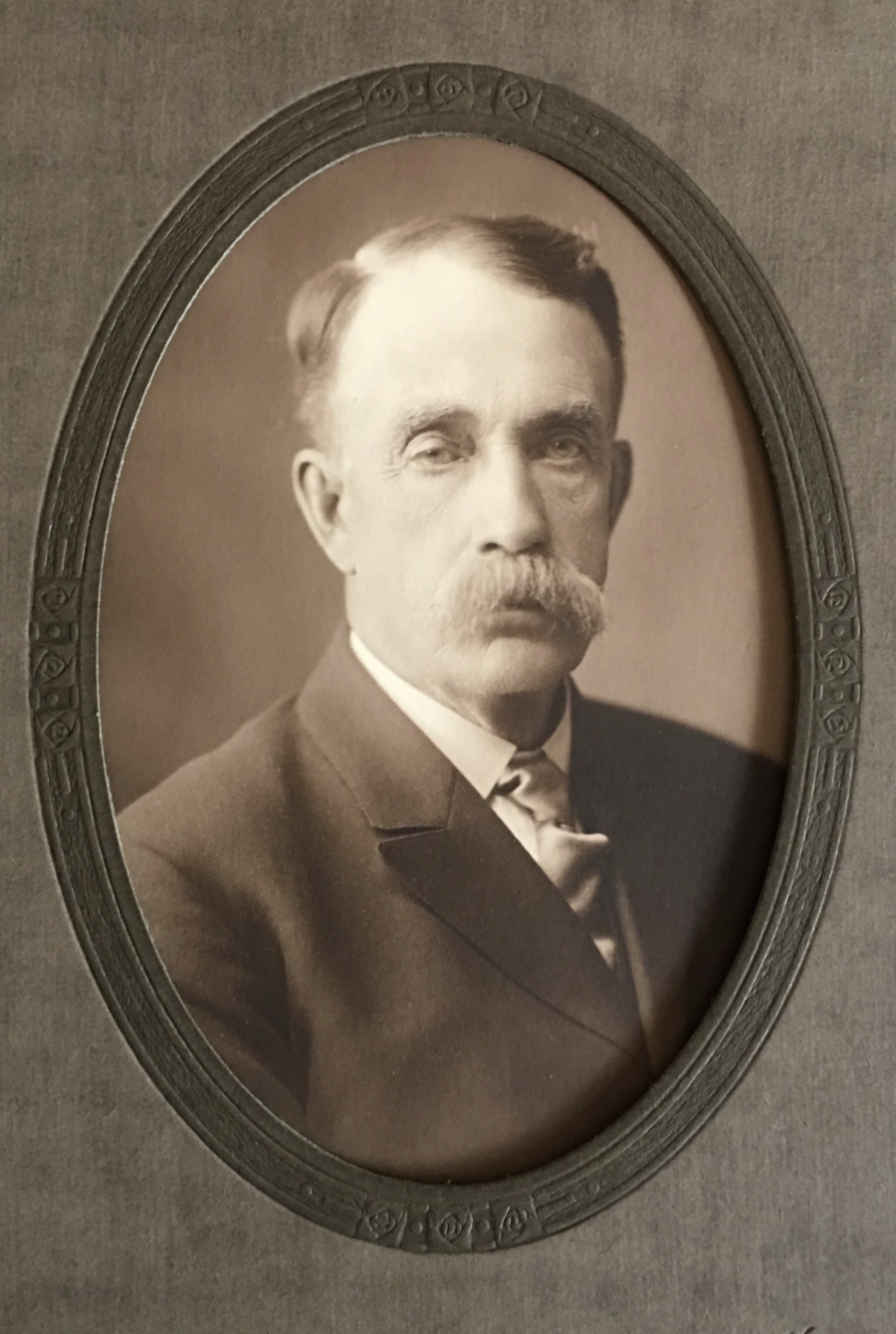
Nelson A. Shaw portrait--courtesy of the Julia Baehre Rothwell collection
Raised a farm boy on his father's 80 acres, he was accustomed to laboring dawn to dusk--clearing land, tending animals, and raising crops. His older brother ran away from home at fourteen in 1862 to become a lumberjack but Nelson remained on the family farm until he was thirty-seven. On December 26, 1880, Nels married Jessie May Burtch, the daughter of Hiram & Annis (Phelps) Burtch of Alpine township. The couple were blessed by the arrival of two children: Fred in 1883 and Bertha May in 1884.
After his father's death, Nels brought his family to Sparta in 1893 where his brother-in-law, Manly Burtch, was a cabinet maker at the Welch Folding Bed factory. Right out of the gate, Nels became an entrepreneur as he operated various businesses from a deep lot he purchased on the north side of Division. The parcel would later become Paul-Lawrence Jewelry and part of the city parking lot. As needs for a product or service presented themselves, Nels ran with the opportunity. Arzie Pinckney occasionally wrote about the Shaw family, "He had a dray business and a very profitable one it was, because in those days everything had to be moved by horses, and he had several. His barns were back of the alley that always existed (and still does only they call it Johnson Street now)."
"Mr. Shaw operated a dray and ice business in town for years. I remember his great ice houses." Something as simple as ice, which we take for granted, was once considered a luxury. It involved a labor intensive process described by Mr. Pinckney: "As soon as the ice in Camp Lake was six or eight inches thick, he would start cutting. He would have five or six teams hauling ice for weeks until the houses were filled. The ice was placed in sawdust to keep it from melting. Then in the spring, they would open the houses and start delivering it. The cakes weighed approximately 100 pounds and sold for 25 cents each, delivered." His work horses also were used in much of the road work for the city and township.
"At that time most everyone burned wood in their kitchen stoves and many folks used wood in their heaters also. So having wood cut and dried for burning was a good business also and he used the vacant lot for storage of his wood supply." By the enumeration of the 1900 Federal Census on June 13th, his primary means to earn a living was with his dray line he called 'City Dray'. It was successful enough that Nels also owned the family home free and clear.
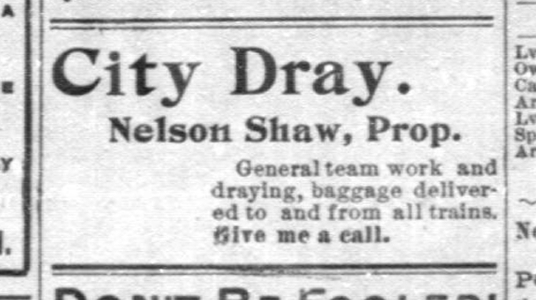
An advertisement for City Dray, owned by Nels Shaw, appeared in the Sparta Sentinel-Leader (May 1901)
A sixteenth birthday gift of an upright piano to their daughter, Bertha, in 1900, encouraged her life-long passion as a pianist. She became one of Sparta's most accomplished accompanists playing at the Sparta Baptist Church for more than thirty-three years. In 1904, she wed Walter Bloomer.
The Fast Track
In 1901, Sparta was the epicenter of racing--or so it seemed. The Decoration Day celebration on May 25th included a 12 mile bicycle road race, a ball game, and a "horse race between Sparta's leading "bloods". The "wheelmen" race course ran north along Mill St (now Union) and northwest of town. Racers would make two loops. Promotion in the Grand Rapids Press stated "Sparta merchants have offered $200 worth of prizes for a bicycle road race..." and specified it was "open to all Kent county riders except those of Grand Rapids." The Sparta Sentinel-Leader announced the horse race course was "from the hill south of town to the Baptist church" with three heats trotted. At this time, the southern edge of the village ran along Gardner Street, so the hill referred to may have been near the current location of the Tasty Treat, about a half mile.
A second gala of festivities was promoted with a local news headline on June 28th that proclaimed: COMING! COMING! COMING!--The Whole Country is Coming to Sparta Next Thursday... Besides a parade, speeches, a balloon ascension and parachute drop, races of every description were scheduled. A six-mile bicycle race, foot races, sack race, and another horse race on Main Street, a one-half mile run--and so much more. The day would be capped off with a fireworks show. "Sparta's celebration of the glorious Fourth will be the grandest on record" with thousands of people expected. "Boweries and lemonade stands will be everywhere and small boys can eat peanuts and drink red lemonade to their hearts' content." The Sparta Sentinel-Leader proclaimed, "It will be a grand jubilee all day long from the time the sun first peeps over the eastern horizon until the eagle folds his wings and goes to roost in the tall tree tops in the evening. The celebration will positively be the biggest thing ever attempted in Sparta. Wait for the big show."

Nelson Shaw's businesses (in blue) were located on lots 313 (the pool room and ice houses) and 320 (livery)--1910 Sanborn Fire Insurance map
A follow-up after the event reported two Sparta horses took first and second place--Haas (Powers driver) with Van Gordon, respectively, with a Grand Rapids entrant who took third.
However, not everyone approved of hosting races through town. Consequently, it didn't take long for the village council to pass a new law on the heels of the Forth of July events. The title said it all: "An Ordinance to Prevent the Speeding of Horses, Fast Driving and the Racing with and Fast Riding of Bicycles on the Streets or Public Alleys of the Village of Sparta." It limited horses, bicycles, or other modes of locomotion to a speed of no more than eight miles per hour. Penalties were fines between $2-$50 and confinement to the county jail of five to sixty days.
Sparta racing enthusiasts did not take this lying down.
Although not quite a Churchill Downs, Sparta once had its own racetrack. On March 25, 1902, the Grand Rapids Press published SPARTA WILL HAVE RACES. New Driving Association Has Been Organized to Hold Them with the details: "The Sparta Driving association has been organized here and races will be held this summer. The officers of the organization are: President Allen B. Way; treasurer, William A. Anderson; secretary, Frank D. Kellogg; directors: Morris Haas, Nelson A. Shaw and Ed Pease. The old Hilton track just west of town, which has remained idle for several years, has been leased for a term of five years and work will be commenced today on the buildings. Ample capital is behind the undertaking. The first race will be held the latter part of May or early June. When in good condition the course is one of the finest half-mile tracks in the state." This group of businessmen established, participated in, and promoted the sport at the location more recently known as the County Roads building property and currently is the police station.
The Sparta Driving association's first race was locally promoted with a program to consist of "a three-minute trot, a three-year-old race and a race between Elmerin and Charlie Ellis, horses owned by William Powers and Alonzo Van Gordon, two well known business men."
FOUR RACES AT SPARTA--The New Hilton Driving Park Is Formally Opened. "Sparta, Mich., June 28,--Hilton park was opened to the public yesterday afternoon with a crowd of 2,000 people. Charlie Ellis, a Sparta horse won the 2:40 trot in 2:40-1/3. Rube, a Cedar Springs horse, won the 3-year-old race. Sleepy Dick, owned by Frank Kellogg, took the 3-minute-trot. Thane Hulett captured the 8-mile wheel race in 9:44."--Grand Rapids Press (28 Jun 1902).
Lady Luck smiled on Sparta's race track. A 1902 item in the Grand Rapids Press reported "Sparta, Mich., Aug. 2.--The town is full of horsemen from all over northern Kent today and the crowd at the races this afternoon will break all records. A long string of horses is here from Grand Rapids, Casnovia, Ravenna, Cedar Springs and Conklin. Much betting is being done."
The competitive spirit was alive and well in Sparta. Some of the other local men mentioned in various articles as participants or winners in horse races at Sparta or in the general area included Alonzo Van Gordon, Will Powers, Morris Haas, Frank Kellogg, Dick Myers, James S. Tozer, and none other than the Sparta Baptist minister, J.H. Maynard.
Put on Your Dancing Shoes
Popularity of boweries piqued Nels' interest and inspired a new business enterprise, "...the lot was used for other things as well. I remember that on the Forth of July after the State Bank was built (on the northeast corner of Division and Union; note: in 1902), there was always a bowery dance hall set up there. This was just a nice smooth floor and frame built over it. Usually it had a canvas cover over it and benches in along the side and ends of the floor. It was one of the busiest places in town. Dances all day and until after midnight or as long as the crowd stayed. Dances were paid for after each dance and not by the evening. Sometimes the bowery was not taken down for several weeks. Dances were held every Saturday night if weather permitted."

Nelson A. Shaw & Walter E. Bloomer's Palace Livery advertised in the Grand Rapids Press (14 Nov 1908)
"I remember that in 1907 Mr. Nelson (Nels) Shaw bought the Blackall property on E. Division Street and erected the cement block building that stands there now. Nels had been in different kinds of business for most of his adult life. He built the building for a livery barn. He had a number of horses, some of which were driving horses and were rented out to people, and if necessary, he would furnish a driver. Some of the doctors and traveling men that came to Sparta always used his services. Most of the time, his son-in-law, Walter Bloomer, did the driving for he managed the business." Arzie stated the livery could accommodate fifty horses and "...Walter Bloomer, operated the barn and had twenty-six livery and draft horses that were also busy."
"The original floor of the building was about four feet above the street level and was reached by a ramp that started with the sidewalk, and the main floor was used to house the buggies, etc. The horses were kept in the basement while the hay was in the second story."
Games of Chance
Before 1910, Nels built a billiards hall. Arzie recalled the inside walls were plaster board finished with a coat of stucco. By 1918, the village required a license to operate pocket billiards tables at pool rooms and Mr. Shaw obtained a license for seven pocket billiard tables. Over the years, the pool room was operated by several men--a couple of which were E.L. Spitzer in 1922 and briefly in early 1923 was Charles Badgerow. The building was sold in 1927 to be used for another purpose.
Public Servant
Perhaps it was the enactment of the village ordinance to prohibit racing that pressed Nelson to enter local politics. Often, one issue serves as the impetus. Always active in the community, Nelson served as village president, township treasurer, highway commissioner, served eighteen years as a member of the village council, and served on the board of education. He was also a founding board member and vice president of the Peoples State bank.
Arzie Pinckney knew the Shaw family well. He wrote about Nels in his Sentinel Leader "I Remember" columns (published on 25 Nov 1964, 31 May 1967, and 18 Jun 1969) while he resided with his daughter, Maxine Cummings' family on Centennial--across the street from Walter Bloomer.
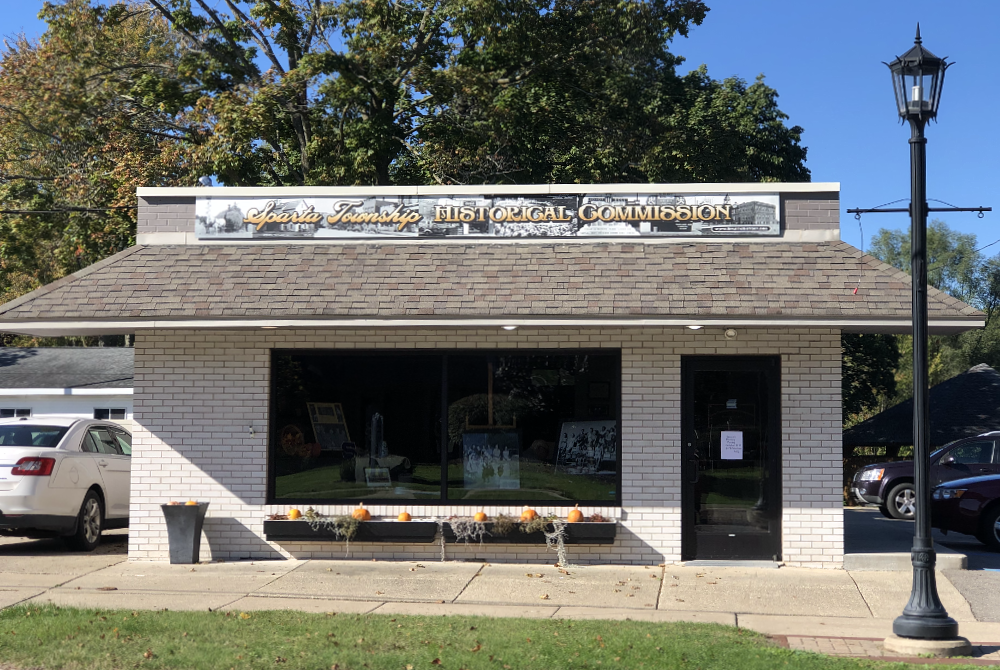
Sparta Township Historical Commission headquarters at 71 North Union Street
Our History Center is conveniently located at 71 North Union Street in downtown Sparta. Please join us for coffee and lively conversation on Monday mornings. Visits to the History Center can also be scheduled by appointment, for your convenience.
We do not receive mail at the History Center, instead, please use our mailing address, which is:
attn: Sparta Township Historical Commission
Sparta Township
160 E. Division St.
Sparta MI 49345
Our complete archives are now available online for your convenience. Just click STHC PastPerfect Catalog Access and begin your research!
For other inquiries, the Sparta Township Historical Commission can be reached by phone at: (616)606-0765 or via email at the following address: